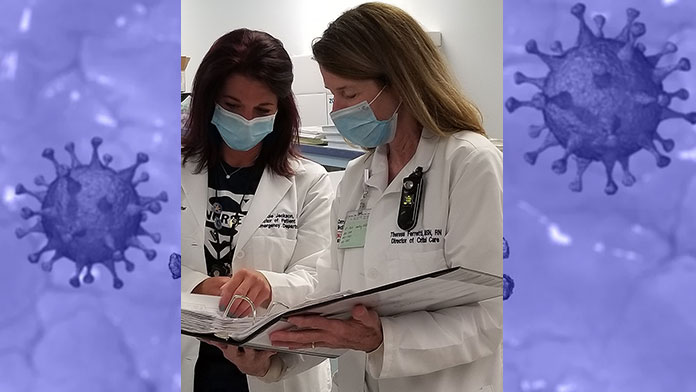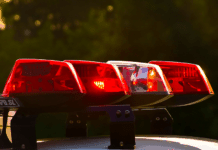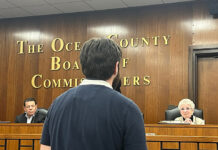
NEW JERSEY – Howell resident Nicole Jackson serves as the Interim Director of Patient Care at Community Medical Center in Toms River. She is another front-line fighter in the continuing war on the coronavirus.
She told Jersey Shore Online about how medical professionals have had to change operations at work – and how they had to change their habits at home – in the wake of COVID-19.
In her hospital role she oversees the workflow and what the nurses do. Also, she makes sure that procedures are being followed, and helps make new policies as more information about the virus emerges. That includes all the new rules that came about since the pandemic conditions began back in March.
“We had to adjust everything. The way we triage patients coming into the hospital and the way we treated patients while they were in the hospital. Even how we were around each other. We had to constantly watch each other and keep ourselves safe,” she said.
Jackson noted, “we had to protect ourselves and our families when we went home. Everything changed in a matter of a week or so. We knew we had to change things and we started to think about what we could change to make it a better experience for everybody coming in: nurses, staff, family members. When you work in the ER it is like the front line of care.”
She said triaging began right from the front door. “Once the virus really hit, we weren’t doing elective surgeries and not doing a lot of stuff in the main hospital where a lot of procedures and outpatient testing was done. That all stopped.”
“They had to change how they did everything. I’ve worked in a hospital for 25 years. Every time I went up to the IC (intensive care) with a patient I was taken aback. I was so impressed by them. The job they were doing and what they were doing to make everybody safer,” Jackson said.
Jackson said additions like plastic partitions and temporary walls in the ER were put up. “They stopped visitors coming in but we did let certain family members come in. Those end of life patients and some children patients.”
“We had a tent up for a while to test (people) first before they could come into the emergency room. When things started to settle down we took the tent down,” Jackson said, noting the rapidly changing information each day.
“It was a constant changing of what we were supposed to do and should be doing. It got scary a lot of times. We didn’t know. None of us had ever worked through a pandemic.
“It was new ground for all of us. It was completely different than any of us had ever seen. We have gone back to a lot of our normal operating procedures but there is always that underlining COVID. I think the only thing we have known the whole time is that we don’t know anything,” Jackson said.
Jackson said the situation, much like the virus, kept evolving. “Every day you are waiting to hear the governor’s press conference and you would listen to hear what the task force and the CDC (Center for Disease Control) was saying and what our corporate was saying and now you are waiting for the next surge.”
“If this happens again, what will happen? We haven’t gotten through the first wave. The only thing I can confidentially say that now that we’ve gone through it we know what we need to do. You do what you have to do and we did what we had to do,” Jackson added.
Her own homelife routine – like most everyone – saw its share of disruption. “When this all started I worked nights and I have two children, 12 and 16. They are a bit older so it was okay in that one day schools were normal and the next day there was talk of closing and the next thing they were closed.”
“I ended up going to day shift because they needed leadership on day shift when I was the assistant director at night at the time. I switched to days to help for a while.”
She added, “the world stopped. I went from being a single mom who worked a few nights a week with two kids that are active in baseball and dance to working five days a week with nothing to do in the other time. We had a whole decontamination process when I came home. You don’t want to bring anything into the house.”
Jackson explained the process saying, “they would have a towel ready for me at the back door and we had a little room so I could undress and then shower before I’d see anybody. I had a backup plan if I ever got sick. I wasn’t going to come home to them. I would stay at the hospital. Thankfully I never did.”
“We spent a lot more time together which was nice. We didn’t get to see the extended family much. Now things are getting back to normal a little bit but for how long, who knows?” she added.
Being a mom of two teens and a new school year having begun in Howell through a hybrid model of live instruction and remote learning, Jackson said she understood the challenges her community’s school district has.
She said, “if you look at the transmission rates of children, they are not so high but the bigger picture is who are they in school with and who do they go home to?”
“I honestly feel having worked with this for the last several months that they do need to go back and be somewhat socialized. The social isolation is not great for them but I am definitely onboard with it being half a day, definitely part remotely,” she said.
Her high school age son who plays football and attends the Freehold Regional High School District at Freehold Township High School is starting off entirely through remote learning.
“I think they will do what’s best and I think it will be constantly changing,” Jackson said noting that anything could happen and that both her children could return to a remote-only option should a new surge occur or that when certain health and safety conditions were met in Freehold, that her son could return to some live instruction.
The hospital staff are flexible, too. They can get the screening tent back up in front of the emergency room lobby within an hour if the conditions warranted it. Items like that were labeled and put aside “and is here when we need it. I don’t think any of us feel that this has gone away or it is gone.”

Even with the event of vaccines becoming available in the months to come, she understands some of the trepidation people may have to taking them. “Who wants to be the guinea pig? There might be a lot of volunteers but who knows. I think this is a new normal now we will have to get used to.”
She added that those working in the medical community, “are just as scared as they (the public) are but this is my job. It is what I signed up for. When you hear people say ‘Is this real? Is this really happening?’ I say there is nothing fake about it. It is happening.”
“We saw the sick people. We saw the people die. There were people who were not sick at all that had it and that is the other misconception, there a lot of people who aren’t even sick who have it which is why it is so important that they stay safe and do what they are supposed to do,” Jackson added.






